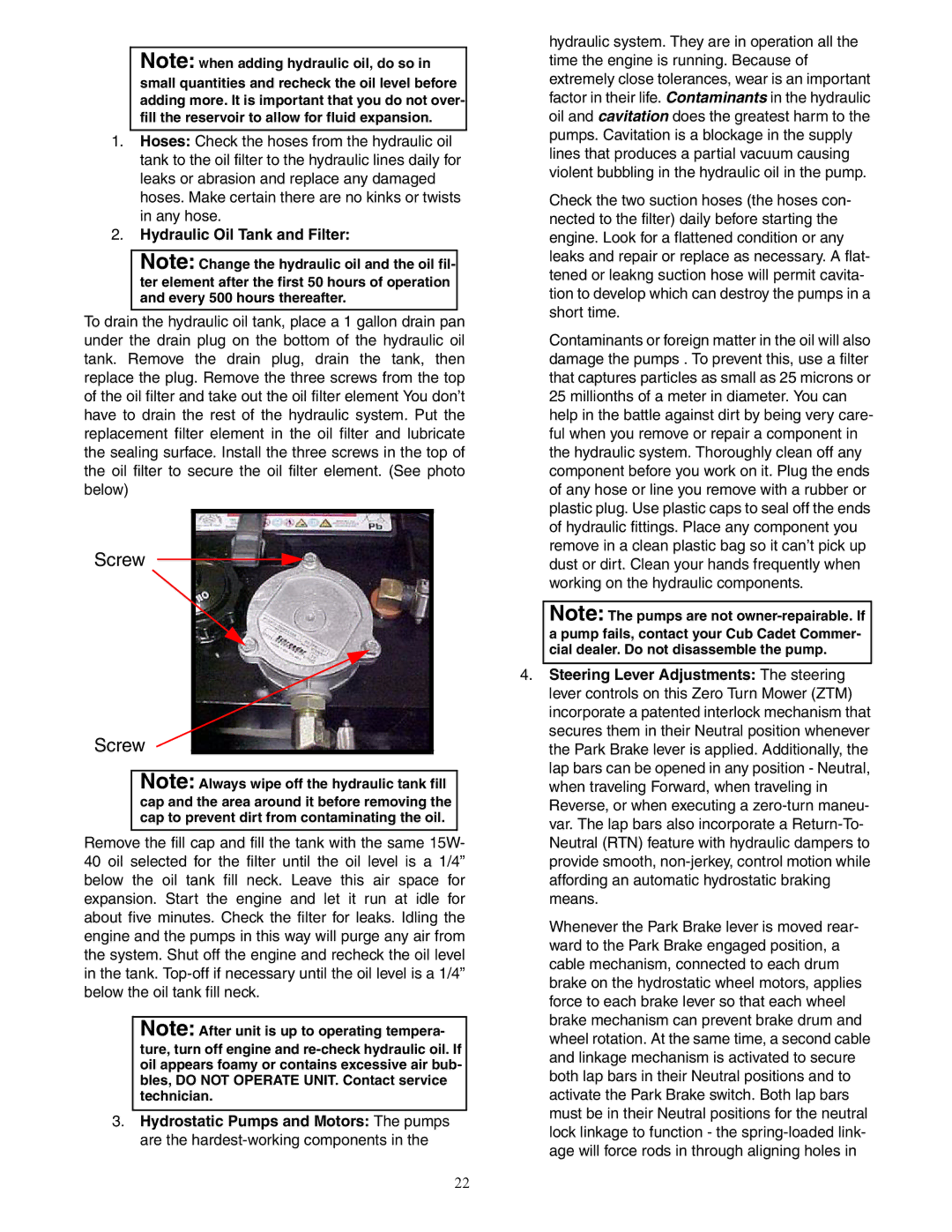
Note: When adding hydraulic oil, do so in small quantities and recheck the oil level before adding more. It is important that you do not over- fill the reservoir to allow for fluid expansion.
1.Hoses: Check the hoses from the hydraulic oil tank to the oil filter to the hydraulic lines daily for leaks or abrasion and replace any damaged hoses. Make certain there are no kinks or twists in any hose.
2.Hydraulic Oil Tank and Filter:
Note: Change the hydraulic oil and the oil fil- ter element after the first 50 hours of operation and every 500 hours thereafter.
To drain the hydraulic oil tank, place a 1 gallon drain pan under the drain plug on the bottom of the hydraulic oil tank. Remove the drain plug, drain the tank, then replace the plug. Remove the three screws from the top of the oil filter and take out the oil filter element You don’t have to drain the rest of the hydraulic system. Put the replacement filter element in the oil filter and lubricate the sealing surface. Install the three screws in the top of the oil filter to secure the oil filter element. (See photo below)
Screw
Screw
Note: Always wipe off the hydraulic tank fill cap and the area around it before removing the cap to prevent dirt from contaminating the oil.
Remove the fill cap and fill the tank with the same 15W- 40 oil selected for the filter until the oil level is a 1/4” below the oil tank fill neck. Leave this air space for expansion. Start the engine and let it run at idle for about five minutes. Check the filter for leaks. Idling the engine and the pumps in this way will purge any air from the system. Shut off the engine and recheck the oil level in the tank.
Note: After unit is up to operating tempera- ture, turn off engine and
3.Hydrostatic Pumps and Motors: The pumps are the
hydraulic system. They are in operation all the time the engine is running. Because of extremely close tolerances, wear is an important factor in their life. Contaminants in the hydraulic oil and cavitation does the greatest harm to the pumps. Cavitation is a blockage in the supply lines that produces a partial vacuum causing violent bubbling in the hydraulic oil in the pump.
Check the two suction hoses (the hoses con- nected to the filter) daily before starting the engine. Look for a flattened condition or any leaks and repair or replace as necessary. A flat- tened or leakng suction hose will permit cavita- tion to develop which can destroy the pumps in a short time.
Contaminants or foreign matter in the oil will also damage the pumps . To prevent this, use a filter that captures particles as small as 25 microns or 25 millionths of a meter in diameter. You can help in the battle against dirt by being very care- ful when you remove or repair a component in the hydraulic system. Thoroughly clean off any component before you work on it. Plug the ends of any hose or line you remove with a rubber or plastic plug. Use plastic caps to seal off the ends of hydraulic fittings. Place any component you remove in a clean plastic bag so it can’t pick up dust or dirt. Clean your hands frequently when working on the hydraulic components.
Note: The pumps are not
4.Steering Lever Adjustments: The steering lever controls on this Zero Turn Mower (ZTM) incorporate a patented interlock mechanism that secures them in their Neutral position whenever the Park Brake lever is applied. Additionally, the lap bars can be opened in any position - Neutral, when traveling Forward, when traveling in Reverse, or when executing a
Whenever the Park Brake lever is moved rear- ward to the Park Brake engaged position, a cable mechanism, connected to each drum brake on the hydrostatic wheel motors, applies force to each brake lever so that each wheel brake mechanism can prevent brake drum and wheel rotation. At the same time, a second cable and linkage mechanism is activated to secure both lap bars in their Neutral positions and to activate the Park Brake switch. Both lap bars must be in their Neutral positions for the neutral lock linkage to function - the
22
